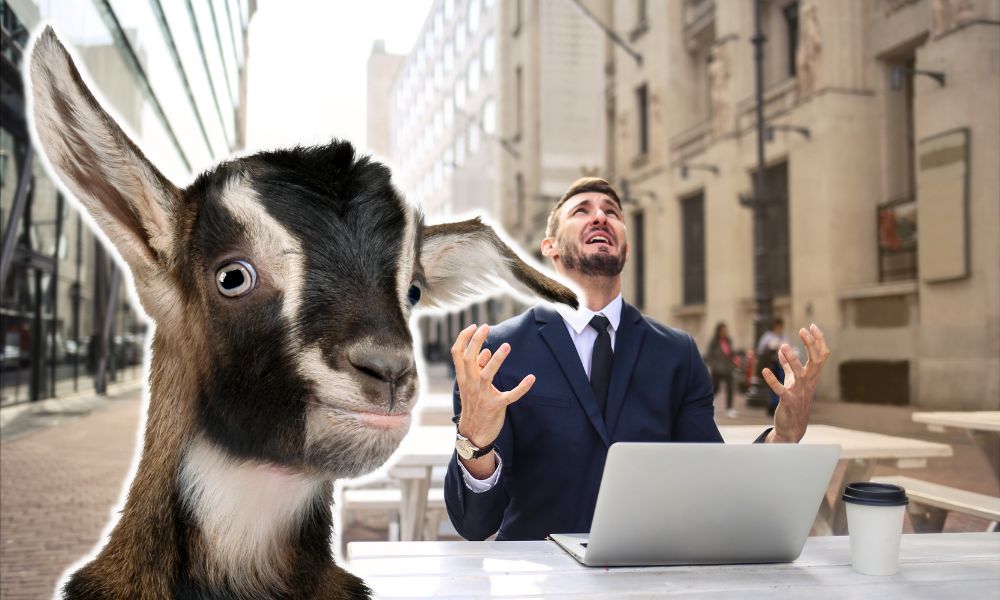It is an interesting phrase with an interestingly equal origin, then, but the basic meaning is that it makes you feel, in one way or another, bad.
You are upset, annoyed, irritated, or otherwise feeling negative about what’s happening.
We’ll look more at how this phrase works in sentences and where it comes from precisely.
Let’s look into this.

What does “gets my goat” mean?
For something to get your goat, it means that it upsets you in one way or another.
For example, you might say ‘This TV show really gets my goat!’ if it is a show that annoys you or that you hate.
You could swap it for anything, really, although there is a more specific meaning to the phrase than simple dislike of something.
It is usually quite specifically about annoyance, irritation, and frustration.
Something that gets your goat is something which occupies your mind, takes up thinking space, and which you spend time thinking about to the detriment of other things.
Just like being annoyed by anything, it’s often difficult to stop thinking about it.
This is part of the problem of being annoyed.
The other thing is when it is something that brings down your whole mood.
This is another aspect of frustration.
Sometimes, you even know exactly what’s causing your bad mood, and that it’s quite silly that it is.
Still, though, you can’t seem to cheer up.
This makes things worse.
This aspect of being actively upset, as an aspect of being annoyed and frustrated, is the final piece of the puzzle to understanding this phrase.
To further elucidate, let’s look at the origin of the phrase.
What is the origin of the phrase “gets my goat”?
As I mentioned, this phrase has its origin in horse racing.
Traditionally, it’s seen as very important to keep a race horse as calm as possible before a race.
The reasons for this are obvious.
It is much more likely to perform well if it is calm and happy.
One way in the past, and still practiced today, that people attempted to keep racehorses calm before races was to give them a goat companion in their stable.
The goat would act as a herd member, calming the horse’s fears of isolation and helping it stay calm.
Whether or not this actually works is another thing.
In many cases, it probably does—horses are herd animals, and isolation can be stressful for them. a goat is a more manageable sized companion, which can be easily procured.
But horse racing is an incredible competitive industry.
Other teams would seek to sabotage rival horses. one way this was done was to steal the goat from the stable the night before the race.
This would make the horses stressed, anxious, and uncomfortable, meaning they wouldn’t perform well in the race.
So, someone would ‘get your goat’ in order to upset your horse and, in turn, you!
This is the origin of the phrase, and hopefully helps make its meaning a bit clearer.
Is it “get your goat” or “get your goad”?
It is not “get your goad”, it’s “get your goat”.
Goad is an entirely different word, a verb, in fact, and not a noun.
To goad means to provoke or annoy someone in order to get a certain reaction out of them—trying to get them to do something.
“Get your goad” is a common misinterpretation of the phrase which, grammatically speaking, would not really mean anything.
As we’ve said, to get your goat has a very specific historical meaning about literally getting someone’s goat.
Someone cannot possess a “goad”.
So, it’s got your goat, not goad.
What does ‘goated’ mean?
This is one you will have heard right, but it has a very different meaning.
This one doesn’t have anything to do with literal goats.
For a long time, in sports particularly, the best players have been referred to as the “G.O.A.T”—the greatest of all time.
In more recent parlance, that has been changed so that now we say things or people are ‘goated’ to mean that they are the best thing in a particular field.
For example, Don Bradman was ‘goated’ at cricket.
Goats play a clear part in a great deal of vocabulary.
We talk about scapegoats, being goated, and, of course, something getting your goat.
There are a variety of reasons this is the case, but the simple fact is that goats have been a part of human life for tens of thousands of years.
It’s perfectly understandable that they should shape our language.
Who knows how many goat-related expressions have already been lost from the English language alone?
